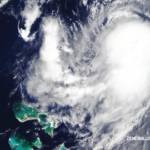Evacuees often have no medical or medication history.
Military Medicine
Angelique Nicole Collamer, MD, a rheumatologist at Walter Reed National Military Medical Center, Bethesda, Md., took the stage to describe the military experience with medical care during times of disaster. She explained that the Uniformed Services University of the Health Sciences (also in Bethesda) is the nation’s medical school. Its goal is to teach physicians how to practice good medicine in bad places with a recognition that the lessons hard-learned in war can apply to disaster response.
She began by noting that gastroenteritis is commonly seen during disasters. Dysentery, and particularly infectious gastroenteritis, has always plagued military operations and is a problem in both war and natural disaster situations. Rheumatic disease has also been documented in the military, with the first incidences reported in the historical medical records of Federal Civil War troops, which reveal that more than 12,000 soldiers were discharged because of chronic rheumatism, many with lumbago, which was probably spondyloarthropathy.1
Some studies have examined whether rheumatological diseases in general are more common in the military. It appears they are not. The Millennium Cohort Study, for example, was a prospective study of systemic lupus erythematosus (SLE) and rheumatoid arthritis (RA) in troops deployed in Iraq and Afghanistan.2 The study found that overall, deployment was not associated with an increased risk of newly reported SLE or RA. This finding is confirmed by the military’s robust electronic medical records, which indicate its members are not at increased risk for rheumatological disease. Although it may be that the military has a healthier worker cohort than the general population, the findings suggest any toxin exposures in the military are not associated with an increased risk of RA or SLE.
Dr. Collamer concluded that although healthcare providers often imagine a disaster will produce patients requiring treatment for trauma, their skills will actually be most needed to provide routine medical care following the disaster. Rheumatologists have the skillset necessary to meet these needs during humanitarian disasters and in wartime. In certain circumstances, they may also be called upon to perform telehealth for patients in need of rheumatologic care.
Lara C. Pullen, PhD, is a medical writer based in the Chicago area.
References
- Bollet AJ. Rheumatic diseases among Civil War troops. Arthritis Rheum. 1991 Sep;34(9):1197–1203.
- Jones KA, Granado NS, Smith B, et al. A prospective study of lupus and rheumatoid arthritis in relation to deployment in support of Iraq and Afghanistan: The millennium cohort study. Autoimmune Dis. Epub 2011 Nov 14.
